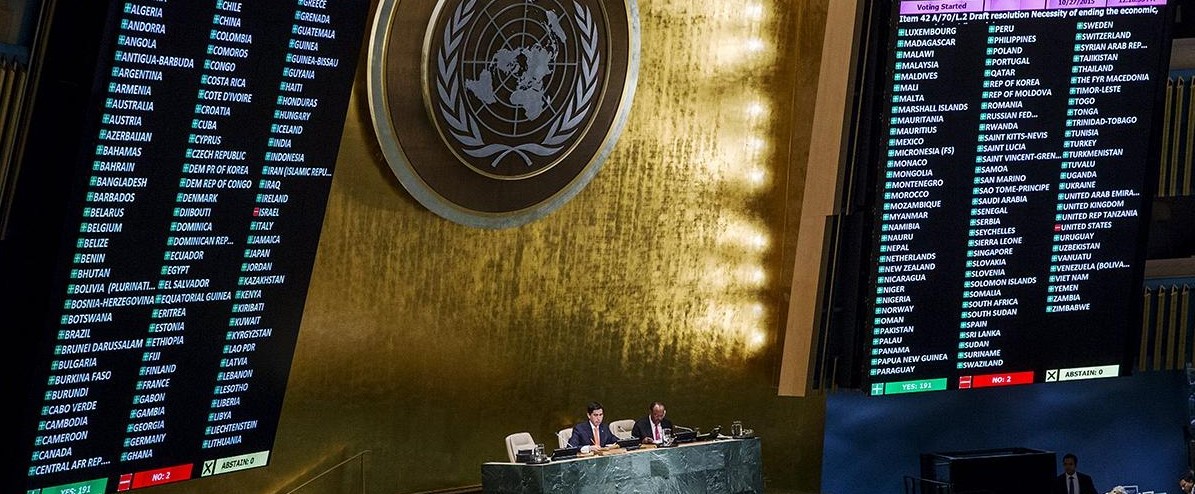The First Committee of the United Nations General Assembly, which focuses on Disarmament and International Security, yesterday adopted a number of resolutions including one that establishes an Open Ended Working Group to take forward multilateral nuclear disarmament negotiations (resolution also available in Arabic, Chinese, French, Russian and Spanish).
The Open Ended Working Group (OEWG), open to all UN member countries and also to civil society, will be convened in Geneva and will run for the equivalent of 15 full working days in 2016. It was proposed by Mexico and 22 co-sponsoring countries, following frustration that the Conference on Disarmament has been unable to negotiate any nuclear disarmament agreements since the Comprehensive Nuclear Test Ban Treaty in 1996. (Iran also submitted a draft resolution to establish an OEWG on nuclear disarmament but withdrew it before the vote).
The original proposal from Mexico was for the OEWG to negotiate legal measures to achieve nuclear disarmament. However, as there is no agreement amongst the co-sponsors of the resolution, let alone the rest of UN members, on what type of agreement or agreements would be best to negotiate, this was amended to a less ambitious mandate to ‘substantively address concrete effective legal measures, legal provisions and norms that will need to be concluded to attain and maintain a world without nuclear weapons.’
Mexico – along with its partners in the New Agenda Coalition – submitted a working paper to the 2015 NPT Review Conference outlining what the main options would be for legal measures to achieve nuclear disarmament. These include a comprehensive nuclear weapons convention (requiring agreement by the nuclear-armed States), a nuclear-weapons-ban treaty, a framework agreement or a hybrid approach. There have also been proposals for a building blocks approach, and a global ban on use followed by negotiations on verified elimination of stockpiles.
These approaches were discussed and developed in an earlier OEWG in 2013. It would be hoped that the 2016 OEWG could progress further and identify which options or legal measures could be negotiated in the near future, report on this to the 2016 UNGA and pave the way for actual negotiations to commence in 2017.
A difficulty is that the resolution was not supported by any of the nuclear armed States (with the exception of North Korea), nor any the countries under extended nuclear deterrence doctrines (NATO members, Australia, Japan and South Korea). If they do not participate in good faith in the OEWG, then non-nuclear States may decide to start an alternative process outside the UN – such as was done with the treaties to prohibit landmines and cluster munitions, neither of which is supported universally.
Civil society in the nuclear-armed and allied States, therefore has a vital role to play – encourage your governments to participate in the OEWG.
Other new UN resolutions
There were a number of other nuclear disarmament resolutions adopted at the First Committee. Some of these were resolutions repeated from earlier years. However, there were a few new ones including one on a Universal Declaration on the Achievement of a Nuclear-Weapon-Free World, and several which highlight the humanitarian impact of nuclear weapons and the imperative for their abolition. See UN to vote on nuclear disarmament resolutions.
In general, these resolutions were supported by non-nuclear States and opposed by nuclear-armed States. The nuclear allies (NATO countries, Australia, Japan and South Korea) either abstained or opposed. (Click here to see the resolutions and voting records). An exception was the resolution United action towards the total elimination of nuclear weapons, which gained support from most of the allies because it ‘balanced’ the humanitarian imperative for nuclear abolition with an acceptance that there remain some security reasons for nuclear weapons.
This again points to a need for civil society in these countries to convince their governments that security can be achieved without reliance on nuclear deterrence.
Indeed, one of the recommendations made to the 2013 OEWG was for a detailed analysis to be done of all the security situations in which governments ascribe a role to nuclear deterrence, evaluate whether nuclear deterrence can indeed play a role in those circumstances and, if so, to offer feasible alternatives to nuclear deterrence to meet these needs.
The risks of nuclear weapons use (by accident, miscalculation or intent) and the catastrophic consequences of any use of nuclear weapons, establish the imperative to eliminate the roles ascribed to nuclear weapons, and to negotiate for complete nuclear disarmament.
For more information see:

